Need Help? We are right here!
Need Help? We are right here!
Thanks for your Enquiry. Our team will soon reach out to you.
If you don't hear from us within 24 hours, please feel free to send a follow-up email to uemsupport@xecurify.com
Search Results:
×Want to secure your Odoo ERP logins from untrusted networks? This guide shows you how to restrict Odoo access by IP address, whitelist corporate or VPN networks, and block unauthorized logins for stronger data protection and compliance.
Odoo ERP is the backbone of enterprise operations, but without strict access controls, it's vulnerable to unauthorized logins from untrusted devices and locations. Whether you're using Odoo Online, Odoo.sh, or On-Premise, implementing IP address restriction with miniOrange CASB ensures that only users connecting from corporate networks, VPNs, or approved environments can access Odoo.
When your Odoo ERP is hosted in the cloud, employees and contractors can technically log in from any device and any network. While this flexibility is convenient, it also introduces significant security risks that can put sensitive business data at stake. Restricting Odoo access by IP address ensures that only trusted networks, such as your corporate office, VPN, or approved branch locations, can connect to your ERP system.
Without IP restrictions, stolen credentials or phishing attacks can allow cybercriminals to log in from anywhere in the world. By whitelisting only approved IP ranges, you can block suspicious logins from unknown geographies or public Wi-Fi networks and safeguard your ERP environment.
Even within the organization, accidental or malicious data leakage is a growing concern. IP-based controls ensure that employees cannot bypass security by accessing Odoo from personal devices or unsecured locations. This adds a second layer of defense beyond username and password security.
Industries that handle sensitive financial, HR, or healthcare data often need to demonstrate strict access controls for compliance with GDPR, HIPAA, SOC2, and other regulatory standards. IP whitelisting helps organizations prove controlled, auditable access to Odoo Online, Odoo.sh, or On-Premise ERP environments during compliance audits.
Running Odoo ERP without IP-based restrictions creates serious gaps in enterprise security. While user authentication protects against basic unauthorized access, it does not address the risks that arise when employees, contractors, or attackers log in from untrusted networks or unmanaged devices. Below are the major challenges organizations face when Odoo access is left unrestricted.
If a user's credentials are stolen through phishing, malware, or password reuse, attackers can log in to Odoo from any location or device. Since native Odoo does not enforce IP whitelisting, even a compromised account can be used to access critical ERP data from public Wi-Fi, personal laptops, or international networks.
Odoo provides basic logging, but without real-time reporting and alert, it becomes difficult to spot unusual login behavior, such as repeated failed attempts or logins from unknown geographies. This lack of visibility increases the chances of breaches going undetected until damage is already done.
When Odoo ERP is accessible from anywhere, the attack surface expands dramatically. Hackers can attack or exploit leaked credentials on login portals from unmonitored regions. Without IP-based restrictions, your Odoo environment is constantly exposed to unauthorized access attempts from across the globe.
Organizations with remote employees or third-party contractors often face challenges in balancing security and accessibility. Without IP whitelisting, employees may log in from unsecured networks, while IT teams struggle to enforce consistent policies. This inconsistency leads to higher data leakage risks and compliance failures.
The native Odoo setup provides only limited access controls, leaving enterprises exposed to unauthorized logins and compliance risks. With miniOrange CASB, organizations can enforce IP whitelisting policies that restrict Odoo ERP logins to trusted networks while blocking risky or unapproved connections. This ensures secure ERP access, better visibility, and reduced attack surface.
With miniOrange CASB, you can define specific IP ranges from which Odoo logins are permitted. This ensures that users only access ERP data through trusted corporate networks.
This setup ensures that even if login credentials are compromised, attackers cannot gain access unless they connect from an approved IP.
One of the biggest risks in cloud ERP is when employees attempt to log in from public Wi-Fi, home networks, or personal hotspots. These networks are often insecure and vulnerable to interception.
By cutting off access from unsafe environments, enterprises can drastically reduce the risk of insider threats and external breaches.
miniOrange CASB goes beyond static IP restrictions by enabling context-aware access control that adapts to your business needs.
This layered security model ensures Odoo ERP remains accessible to authorized users while blocking every other access path automatically.
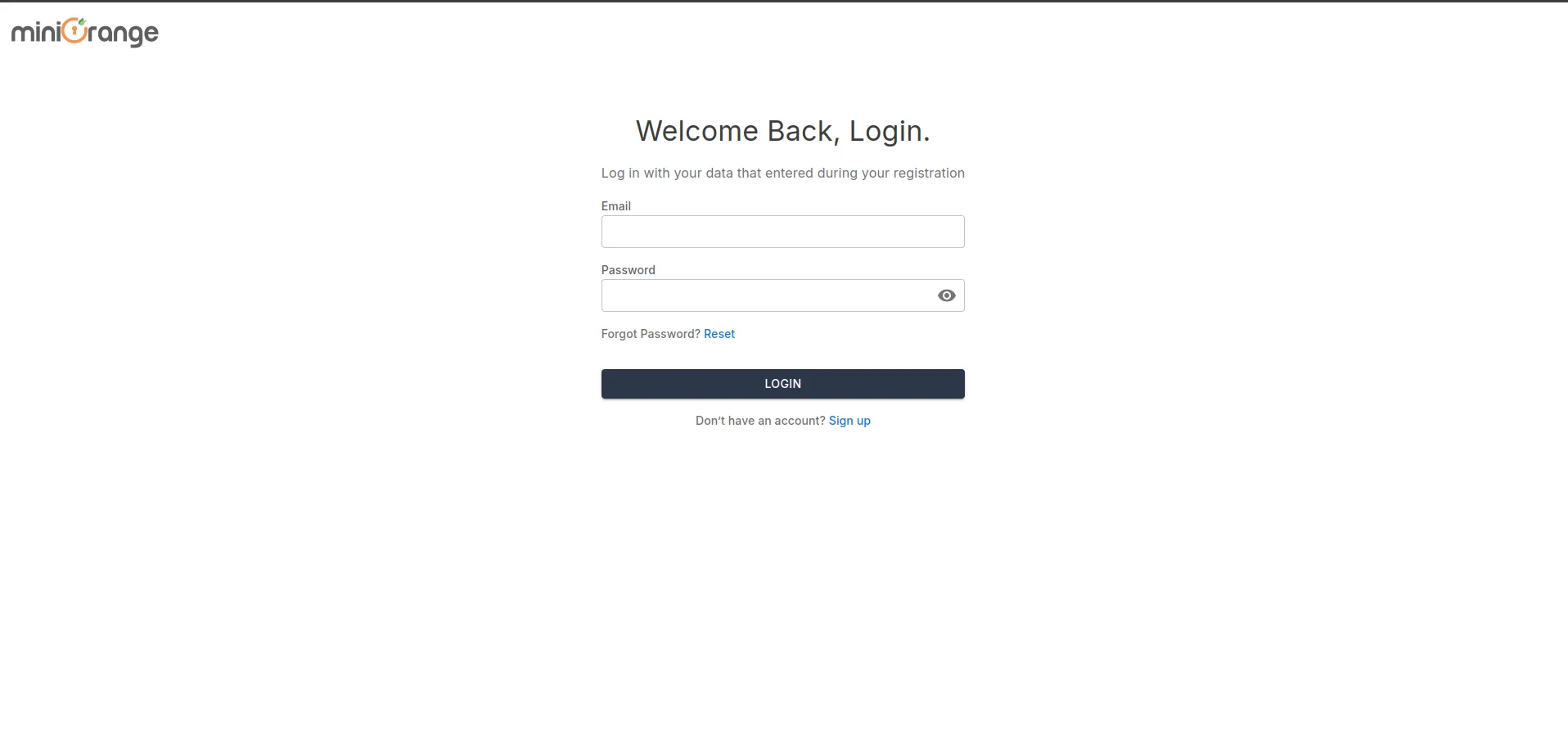
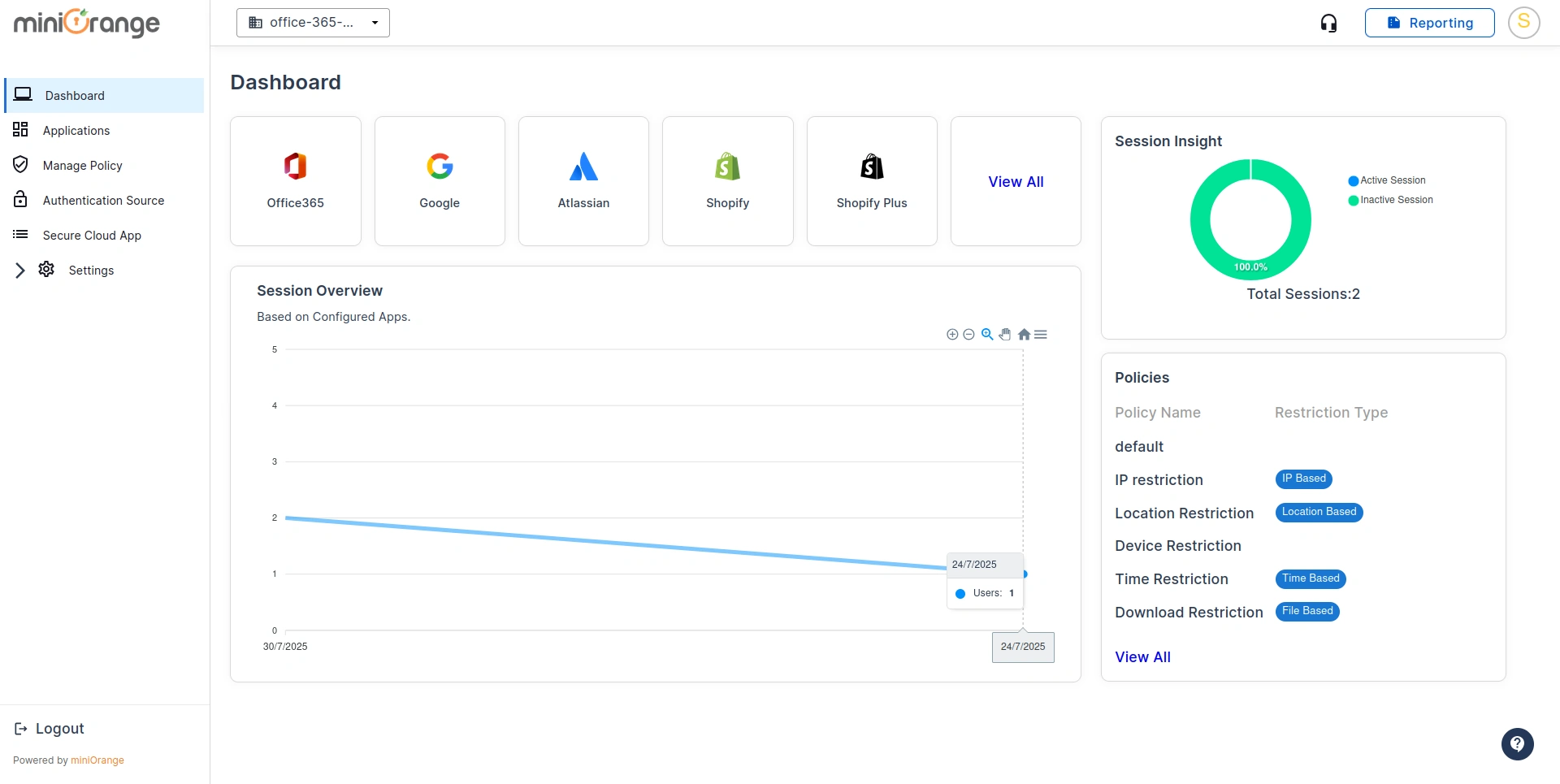
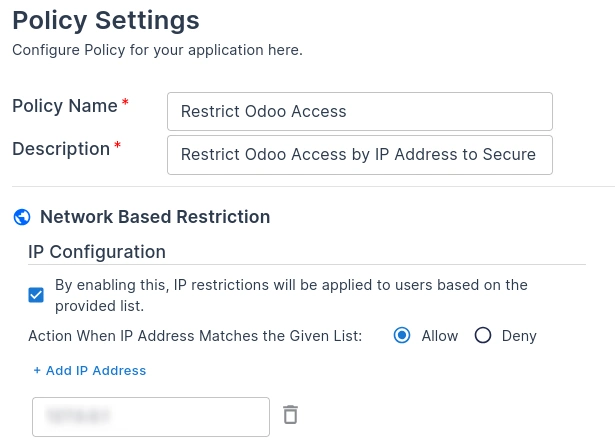
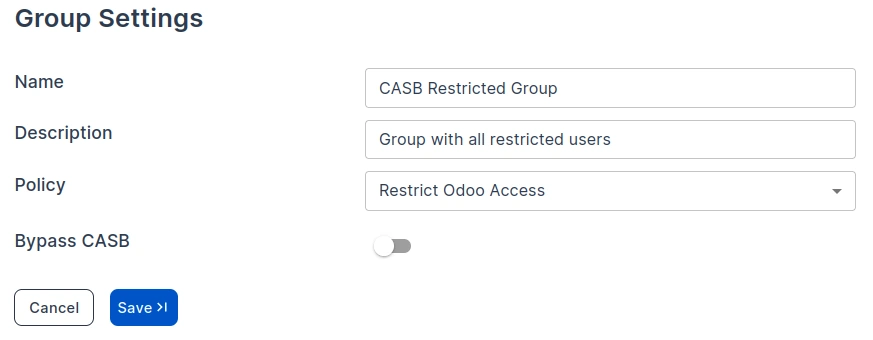
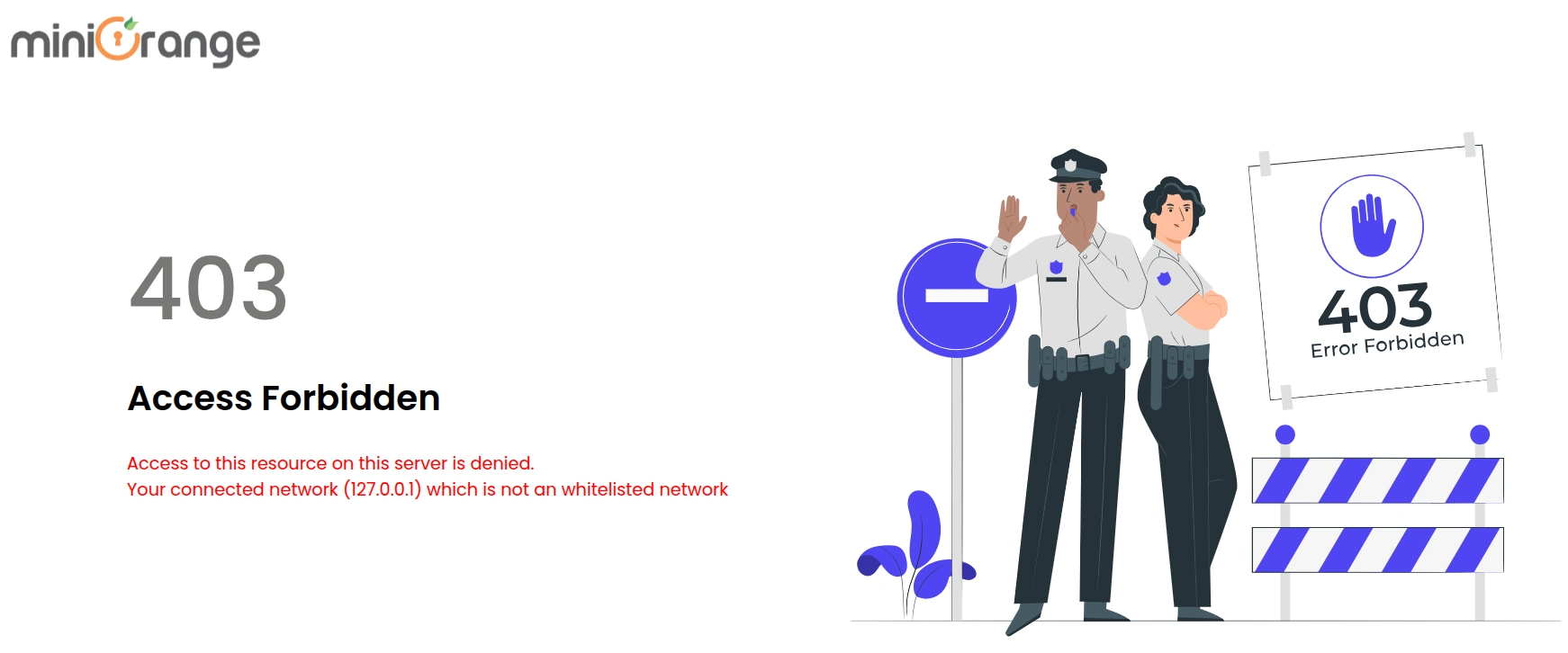
While Odoo provides some access management features, its native IP restriction capabilities are limited. Enterprises that need advanced security, compliance, and continuous monitoring rely on a Cloud Access Security Broker (CASB) like miniOrange. Unlike native Odoo, Google IP restriction and MS O365 IP restriction are already widely adopted. CASB brings the same capability to ERP platforms like Odoo. Below is a detailed comparison of how miniOrange CASB enhances Odoo security with IP whitelisting and beyond.
Restricting Odoo access by IP address is one of the most effective ways to secure ERP logins and safeguard sensitive business data. By limiting access only to trusted corporate networks, VPNs, or approved geographies, enterprises can strike the right balance between security, compliance, and usability.
IP whitelisting ensures that only users connecting from pre-approved corporate or VPN IPs can log in. Even if an attacker steals valid Odoo credentials through phishing or brute force, they cannot access the ERP from an untrusted or unknown network.
By blocking logins from unsecured public Wi-Fi, personal hotspots, or international IPs, businesses significantly reduce their exposure to cyberattacks. This minimizes the risk of data leakage, insider threats, and ransomware incidents that often exploit weak remote access controls.
Regulatory frameworks like GDPR, HIPAA, SOC 2, and ISO 27001 require strong access control and data protection measures. Enforcing IP restrictions on Odoo helps organizations demonstrate compliance, avoid penalties, and build trust with stakeholders by ensuring only authorized users can access sensitive ERP modules.
With miniOrange CASB, administrators get a centralized dashboard to view, manage, and audit all Odoo login activity. Real-time visibility into login attempts, blocked sessions, and policy enforcement makes it easier to detect anomalies and streamline compliance reporting.
Instead of disrupting workflows with complex security layers, IP-based access provides seamless logins for approved users while blocking risky attempts in the background. This allows employees, contractors, and partners to work efficiently within a secure, controlled ERP environment.
IP whitelisting in Odoo ERP is not just a security feature; it's a practical solution for different business teams and industries. From large enterprises to SMBs, restricting access by IP ensures that only trusted networks can connect to critical business data.
Large organizations often struggle to manage thousands of employees and contractors accessing Odoo from different locations. With IP whitelisting, IT admins can enforce ERP access only from corporate office networks or approved VPN tunnels, preventing unauthorized logins from unknown devices and locations.
Finance and HR teams handle sensitive payroll, employee, and compliance data that must be shielded from external threats. Many organizations already secure their employee records in SharePoint with MS 365 CASB, and Odoo IP whitelisting extends the same protection to ERP modules. By limiting access only to secure corporate networks, enterprises can reduce the risk of data breaches, insider leaks, or fraudulent access attempts.
Global organizations with distributed teams need to support remote workers without compromising security. Similar to the measures provided in our remote work security solution, Odoo IP whitelisting allows companies to permit controlled access from approved geographies or VPN-assigned IPs, ensuring remote employees stay productive while the ERP remains protected from high-risk regions and untrusted networks.
Small and mid-sized businesses often lack dedicated IT security teams. With miniOrange CASB's simple IP whitelisting policies, SMBs can easily configure and enforce Odoo access restrictions without complex setups. This ensures strong ERP protection while keeping management overhead minimal.
miniOrange CASB goes beyond just restricting Odoo access by IP. It extends enterprise-grade security with Odoo MDM Mobile Device Management and Odoo DLP Data Loss Prevention to safeguard ERP data from every possible risk.
Explore how miniOrange strengthens Odoo security with advanced add-ons:
Restricting Odoo access by IP address is a proven way to strengthen ERP security, reduce data breach risks, and meet compliance requirements. Native Odoo provides only limited access controls, but with miniOrange CASB, businesses can enforce granular IP whitelisting, block untrusted networks, apply context-aware policies, and monitor logins in real time. From IT administrators securing enterprise networks to finance and HR teams protecting sensitive records, IP-based access control ensures that Odoo ERP is only available to trusted users on approved devices and networks. Whether you're a large enterprise or an SMB with limited IT staff, miniOrange CASB delivers a compliance-ready, easy-to-manage security framework that keeps Odoo ERP safe without disrupting productivity. By adopting Odoo IP restriction with miniOrange CASB, organizations can achieve seamless yet secure ERP logins, safeguard business-critical data, and stay ahead of evolving cyber threats.
